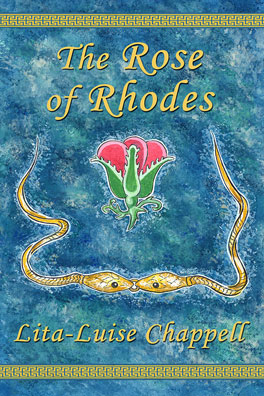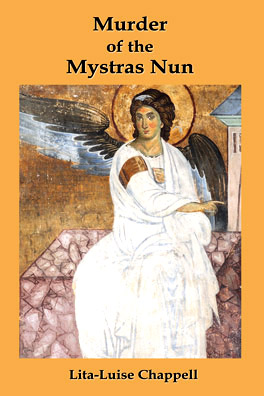
(An excerpt from Murder of the Mystras Nun)
Mystras, April 15, 1715
Chapter 1
Sister Agatha Terentia trudged up the rocky garden path behind the Pantanassa Monastery that rested on the hillside plateau of Mystras. The morning light filtered down through the clouds, lighting up the upper walls of the ruined castle at the top of the town’s steep hill, which was dwarfed by the peaks of Mount Taygetos that rose behind it. Both the castle and the Pantanassa were more than three hundred years old. Despite their age, Agatha could still feel a blessing of sanctity that helped lift her heart. That feeling, however, was more often short-lived. When she retreated into her small room it was a different story. Countless times she sat upon her narrow bed looking up and out of her narrow window, wondering what it might have been like, not to know what she had learned and carried for forty years.
Now at sixty-one she felt her years. The last few winters had caused her body to suffer from the cold. Her fingers had stiffened and her hazel eyes had weakened. She could no longer enjoy the work of stitching with fine silk thread to produce the meticulous lace the nuns had gained a fine reputation for.
She continued to climb the garden path, slowly and steadily, to her favorite wooden bench that rested against the uppermost back wall of stone. Her heart raced, and she wondered how much longer she could make the climb. From her resting place she could look due east and down upon the various levels of the hillside all the way to the horizon. There were fruit trees directly below her that she could easily see over. On the level below the trees was the vegetable garden, and below that, wide flowerbeds bursting with bloom. On the next level was the Pantanassa church and tower, and the long wing of the nun’s quarters, all with red clay roofs. Further down was lower Mystras with its various churches and the inner town. Beyond the lower castle walls were the brown and gray angled roofs of the outer village of Mystras. Finally, she could watch the changing cloud patterns parade over green pastures and olive groves, blending with a lavender haze across the Arcadian plain stretching toward the Aegean Sea.
At her garden perch she found some solace resting under the warm sun, but she always wondered what life would have been like not to know one crucial secret. She would look at the monastery before her, the distance helping to lend perspective, and wonder how she had lived this long knowing one thing, but living another. In one hand she held the knowledge of her forbearers, and in the other she had prayed most of her life for the sins of man. She had been taught that all souls need saving, but a falsehood is still a lie. There was honor in knowing the truth and death in proclaiming it. Had living two lives been better than leading none? Perhaps, but she would never know.
Voices began to drift up from below and interrupt her thoughts. Hidden by apple trees newly plumed with their spring leaves, two sisters walked back and forth discussing the possible succession of the new abbess. Their conversation drew Agatha’s thoughts back to events of the previous month. The Abbess, Sister Alena Palamiti, had been her closest friend, and now she was dead. Alena’s death weighed heavily upon her. Agatha became depressed and fearful for her sisters and the future.
Appointing the new abbess had been delayed until all suitable and acceptable candidates were reviewed. Naturally, the older and most long-standing nuns were interviewed first and discussed among the higher bishops. Ultimately, the final decision rested with the archbishop. There were several leading candidates and Sister Agatha had been chosen as one. However, when she was interviewed and told she was a possible candidate, she paled with the news and flat-out refused to accept such a post, giving her health as the reason. Although her health was a valid concern, she kept the real reason to herself. Instead, she offered the name of Sister Dionne Sandrine, who she believed was the most devoted sister of their Order, was young enough to carry on the work for many more years to come, and loved by all.
As Agatha sat on the bench with her world spread out before her, she reflected upon her life before becoming a nun. She was born in Venice in 1654. Her father had fought for the Venetian army, and when the Venetians took control of the Peloponnese he moved their family to the lower town of Mystras where he was posted. The Venetians had long ago brought the mulberry tree and a booming silk industry had bolstered trade. She and her mother worked a loom, making silk cloth. She also delivered fine silk thread to the nuns at the monastery, and brought the completed lacy items they made down to the lower town market to sell. Her father had served in the army patrolling the town and often went with the troops to neighboring principalities. Two years after arriving, he died from a battle wound. Her mother soon developed a deep melancholy and then a debilitating cough that wracked her body.
When her mother became sick, Agatha began to frequent an apothecary in town. That is when she met Vittoria Acquia, the woman who would change her life.
Unable to pay for the medicine Agatha’s mother needed, Agatha traded beautiful silk cloth in exchange. It was unusual for a woman to have such a position as an apothecary, but Agatha was impressed with the older woman’s success and knowledge, and they grew to become friends. Vittoria had also grown up in Italy, and she had read the works of Coluccio Salutati, an early Italian humanist, and Elena Piscopia, the first woman in the world to receive a Ph.D. in theology, from the University of Padua. Salutati’s beliefs, Piscopia’s knowledge, and their philosophies, had greatly influenced Vittoria, and she shared them with Agatha over long talks.
Though the herbal remedies helped, the health of Agatha’s mother still faltered due to her broken heart. As she grew weaker, Agatha began to pray more and more at the church of the Pantanassa, since she went past it every time she delivered the silk thread. She also got to know several of the nuns who wove the silk into beautiful lacy cloth. Even after Agatha’s mother passed away in 1676, Agatha and Vittoria continued to visit, and both Vittoria and the nuns helped ease the pain she felt for her departed parents.
Shortly after her mother died, Agatha decided that she wanted to become a nun. Then, just as she was about to take her vows, Vittoria, now elderly and dying, called Agatha to her bed. It was then that Vittoria told Agatha the secret and what she was to do with that knowledge. It caused a great quandary within Agatha. In fact, what Vittoria told her conflicted with what she was about to do with her life. But with the strength of their friendship and the draw of her new undertaking with the church, she thought she might be able to honor both. Living a double life had been the most difficult thing she had ever undertaken. In her active role at the monastery she led her life as a devoted nun, but when she was alone in her cell at night or alone in the garden, she relived the narrative she had been told and carried that knowledge with her every night to her bed, praying for a day when she could relieve herself of that burden. Feeling her own life coming to an end, she knew she must act before it was too late.
The bells rang, calling all sisters to the church. The archbishop was about to announce the new abbess. With the excitement and the need to attend as soon as possible, all hurried to the Pantanassa church. A sea of black habits swayed with anticipation while the archbishop stood on the dais like a captain at the helm of a ship, acting as a steering wheel for their faith. When the name of the new abbess was announced, Sister Dionne Sandrine was completely shocked at the news, never expecting it to be her. Agatha smiled. She knew that Dionne deserved it, and it had been a wise choice by the archbishop.
With that decision made, another decision was pressing upon her and it needed to be made soon. The receiver had to be someone from outside the bonds of the church. Choosing to tell a long-standing devoted nun, regardless of the depth of friendship, had been a grave mistake.
Sister Dionne, now her Reverence Abbess Dionne, came to fulfill her new role with humbleness and dignity. Her room next to Sister Agatha’s was left empty, as the new abbess took up residence in the abbess’ quarters nearest the Pantanassa church. Sister Agatha was happy for her and Sister Dionne could see it in her eyes, but Agatha became distant. Dionne missed the simple things they used to share, like walking the halls and the gardens together, praying side by side and sharing some of their personal thoughts and feelings.
Sister Agatha increased her visits to lower Mystras, seeking the friendship of several women in the lower village whom she had helped over the years. She devoted herself to assisting the elderly, the lonely, and the families torn by war and plague. While devoting herself to the needs of many families, she had grown close to several of them. One of them mentioned that the old apothecary shop had reopened. She knew it could only be Vittoria’s daughter, Lyra. When she went to the old shop and peered in, she saw that it was. Agatha remembered the child from when Vittoria was alive. A good many years had passed since she had seen Lyra as a teenager, but her lovely face was the same. Vittoria had sent her growing daughter away to stay with family in Naples, so she could receive a higher education. Now Lyra was back as a grown woman with more than forty years upon her. It was not difficult for Agatha to decide what to do once she perceived the obvious choice.
One month later, on a chilly and foggy morning, the abbess noticed that Agatha had not come to morning Matins or to Prime. After the abbess completed leading prayer, she made her way to Agatha’s room. On the way, she realized that she had not seen Agatha the night before for midnight prayer, either. Perhaps she was in town, or perhaps she had taken ill. She knocked on the door but there was no answer. She knocked again to perhaps wake her, but still no response. Maybe Agatha was too weak to call out? The abbess, now in a rush, thumbed through her keys for the one to cell number six. When she opened the door she stood paralyzed in silent shock. Sister Agatha was laid out upon the grey stone floor, one hand bent in under her chest, and the other arm bent above her head, as if pointing to the heavens.
Dionne called Agatha’s name and reached down to revive her with a slight shake, but as soon as she touched her, she could feel her shoulder was stiff and cold. Sister Dionne gasped and withdrew from the body. Then she walked to Agatha’s side and looked at her countenance. She noticed a whitish powder flecked about Agatha’s lips, but the greatest alarm was seeing her eyes wide open with a look of agony. The abbess pulled away in alarm and backed to the doorway.
Sister Agatha was one of the most devoted and beloved sisters the monastery had. Only two months had elapsed since the passing of the former abbess, and now there was the death of her beloved Sister Agatha. Although the abbess’s first obligation was to report the death to the archbishop, something made her change her mind. She wanted to keep the news quiet until she could reach the local authorities. This was not the quiet passing of a nun in her sleep. This was something much more.
The Reverend Mother closed Sister Agatha’s door and locked it. She needed to go to town herself. She stopped at her office to leave word with another sister of her temporary departure but did not say why. She grabbed her long black cape and headed for the lower town of Mystras outside the gate. She went in search of the office of the local rettore, who was the town’s local protector. She left the compound and made for the postern gate, asking the soldier to rouse the night guard and have him come to her office. As she passed the man, tears began to streak upon her cheek at the loss of her much-loved friend. Why would someone kill a Mystras nun?
The Inspector Reynard Series
- The Rose of Rhodes
- The Cypriot Secret
- Murder of the Mystras Nun
- The Collioure Concealment
The Rose of Rhodes | The Cypriot Secret | Murder Of The Mystras Nun | The Collioure Concealment




 The official website of Lita-Luise Chappell, writer on sex, magic, food, distant lands, and everyday life with articles, poetry, novels, travelogues, rituals, cookbooks, and short-stories.
The official website of Lita-Luise Chappell, writer on sex, magic, food, distant lands, and everyday life with articles, poetry, novels, travelogues, rituals, cookbooks, and short-stories.

